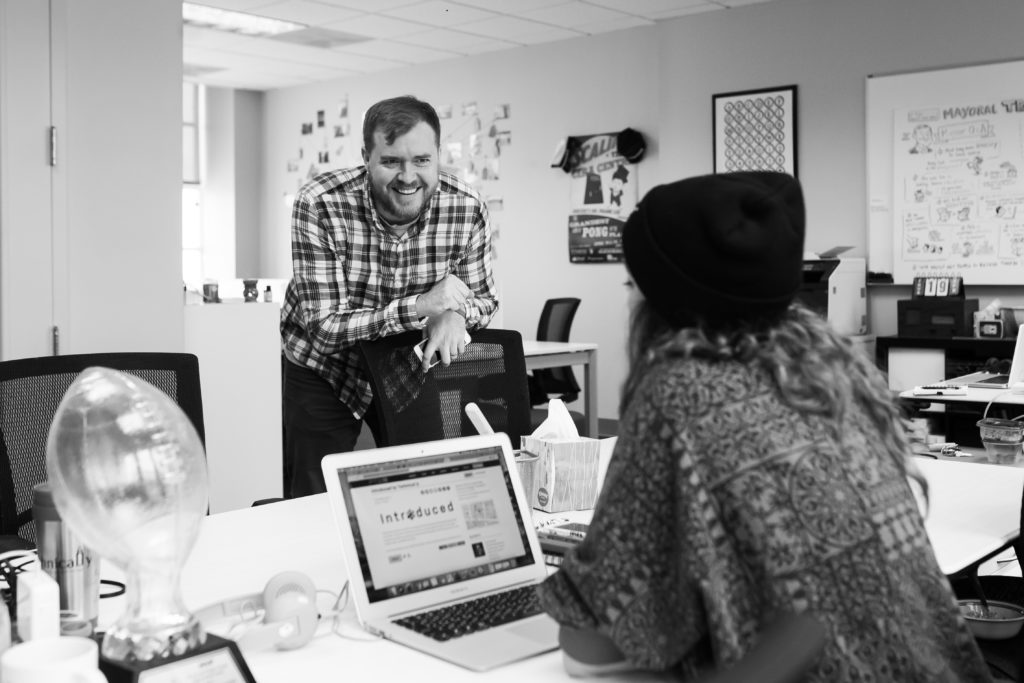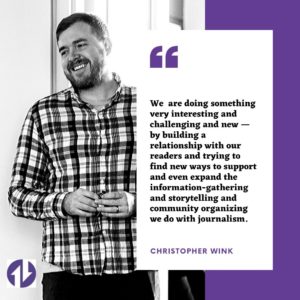Talking 10 years of Generocity: A Q&A with Technically Media’s CEO Chris Wink
 October 4, 2019
Category: Featured, Long, Purpose, Q&A
October 4, 2019
Category: Featured, Long, Purpose, Q&A
All this month we’ll be bringing you stories celebrating Generocity’s 10th anniversary: interviews with the founder, community managers and editors who have shaped this organization from its earliest days; “10 best” lists; a Generocity playlist “with history,” and more!
To kick things off, I spoke with Christopher Wink, the journalist-publisher-founder-CEO of Technically Media, Generocity’s parent company. As always, he makes intriguing observations and provocative predictions about journalism, business models, and how to stay responsive to our community.
Sabrina Vourvoulias: When did you first notice Generocity, and then how did you get from that to deciding it should be a part of Technically Media?
Chris Wink: I met with many of the early contributors to Generocity in its earlier forms, including Mike Kaiser and then Mo Manklang, among others. I was impressed with them and I was interested in the community of nonprofit and impact leaders.
Actually way back in 2010 or so, before Generocity had taken on a publishing approach, internally we built out a plan and wireframes for the badly named PhilanthroPhilly. Like how Technical.ly was an answer to the rise of local tech communities, I saw Generocity as a platform to address a wave of impact professionals.
I met Generocity founder Sandra Baldino via Leadership Philadelphia’s core program, led by Liz Dow. Sandra and I built a friendship and when she was looking for a new home and new direction, I was thrilled she thought we were the right partner. I really credit Sandra with the early foresight to want to impact the philanthropy community of Philadelphia. She did something very powerful for the region.
Sabrina: How has it evolved? What has been its most significant challenge? Its greatest triumph?
Chris: When I pitched Sandra on our acquiring Generocity, I framed the approach we would take this way: Rather than focus on what a nonprofit’s mission is, Generocity should focus on how that nonprofit mission is executed. Though well intentioned, I felt its original editorial focus was serving organizations, not readers. More broadly, Sandra first thought she was going to build a technology solution and later moved to publishing.
During our four years, we’ve had our journey of listening to readers. From the beginning, though, the central question has remained the same: how can we improve the nonprofit, philanthropic and general impact work that takes place in Philadelphia?
Sabrina: Shout out those Generocity alums that have been crucial to its development and formation during the past 10 years.

Christopher Wink speaks to Julie Zeglen, who was Generocity’s editor for three years and is now Technical.ly’s managing editor. (File photo)
Chris: Our first editor Julie Zeglen absolutely masterfully adopted that and deployed an editorial strategy with a level of savvy that blew me away. She has rare instincts for service journalism. Our first Generocity lead reporter, Tony Abraham, did such important and challenging early beat reporting, while we were still discovering what our new voice and beat were exactly. Tony is such a joy and instilled more fun in the brand than it ever had before.
They both had to take a fresh approach but we still honored the important work that came before us thanks to longtime team member and crucial transitional figure Mo Manklang. She gave so much spirit and nonprofit grounding to the brand, and to our organization. She helped shape me, too, as a leader in her time with us.
I didn’t get to work with them directly but Alex Vuocolo and Kristen Gillette gave Generocity journalism DNA before we got there, and I also didn’t get much time with him but I know Dave Raible put so much of his heart into spreading the Generocity brand, among others. I first came to know and respect Generocity because Mike Kaiser did early community organizing that is still rare for news organizations.
There were many others that I just didn’t get to work with; the point is we know a lot of people had to put considerable smarts and effort to get us here, and we honor them for that.
I’m so excited to be in this early era of web-based publishing, which lowers so many barriers. It’s thrilling, but one consequence is that many trick themselves into thinking it is an easy task to develop a respected journalistic brand and publish reporting every single day for years. More goes into developing a brand promise and the model that supports it than most know, and we need to do a better job of telling that story.
Sabrina: Where do you see Generocity going in the next ten years? Predictions we can hold you to?
Chris: I think there are many similarities between the growth of early-stage technology communities and that of social impact communities. By that I mean 10 years ago we believed that a conversation that was really only happening in Silicon Valley and a few other places would come to every big city and ultimately, like it always does, the latest examples of technology would break down and become ubiquitous.
So I predict that what is still seen as a somewhat nuanced and fringe community of impact-minded nonprofit professionals with modern approaches will eventually fade in to normalcy. So for me I think we are approaching the big story of how Philadelphia or really any regional economy evolves in dramatic periods of change but doing so through the narrative arc of the niche communities that are most likely to have the biggest impact. 
For a more specific bet you can hold me to, I expect that in 10 years Generocity won’t be seen first as a news organization but instead as something that serves its community — which includes acts of journalism.
I am cheating a little bit because as you know, Sabrina, I don’t actually think we’ll have nearly any news organizations as we understand them today in a decade, outside of nonprofit models that exist primarily to maintain the best of what we developed in the 20th century.
Instead, if we are to maintain important journalism for local communities I believe we’ll all have to evolve into different organizations with different models. For us right now sitting at the 10th anniversary of when that generocity.org domain was first bought, I think the professional development work that happens now and will continue to grow around continuing education, is a vibrant place for us to explore.
But I’m too familiar with growing organizations — particularly in the green fields of of industries with completely disrupted business models — to be certain that that’s the right answer to last another decade. What I do know is we still have many years to go of dramatic change for those of us who want to serve communities with journalism.
Sabrina: Tell me something about Generocity it hasn’t occurred to me to ask you.
Chris: I think most all of us journalism practitioners are really rotten at explaining to our readers just how dramatically our work has been transformed by the web; truly more than any other industry there is — not music nor taxi cabs —I don’t think anything has gone from power to pauper like publishing.
So at any opportunity like this I think it’s important for us to remind our readers that we are doing something very interesting and challenging and new — by building a relationship with our readers and trying to find new ways to support and even expand the information-gathering and storytelling and community organizing we do with journalism.
We have our journalism fund and our events and other services, but I think you will see us over the next few years further communicate to our readers that we want to help them navigate their own careers and help them have a more fulfilling life … while supporting the free and accessible information we put out in the world every day.
Trending News










